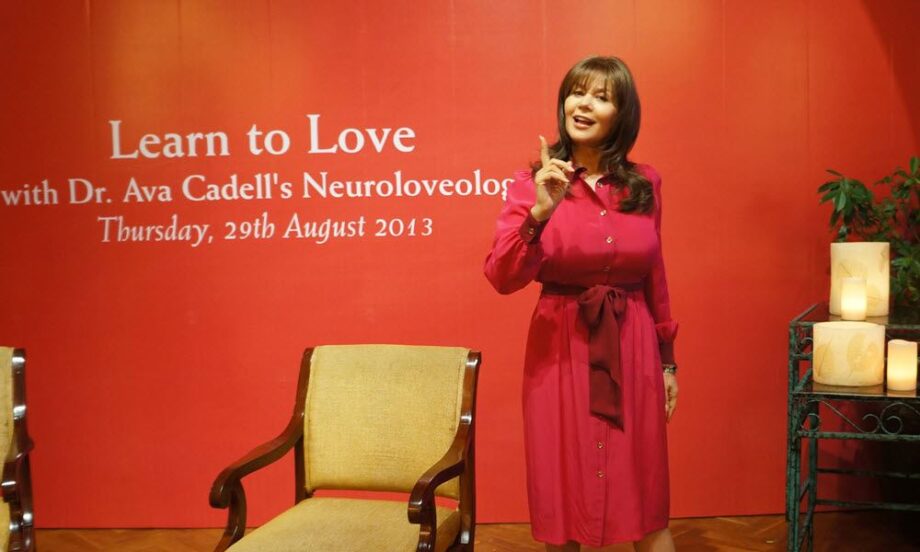We all like to think that great sex comes naturally, but sex therapists know that it takes knowledge, communication, empathy, self awareness and, well, practice, to get there. That's where sex therapists come in. Although this broad term can encompass a range of different professionals, those who work in careers in sex and relationship therapy and coaching can help people solve a range of sexual problems, from physical ones stemming from surgical procedures to emotional ones stemming from past experiences and abuse. In other words, it's important work!
If you've ever struggled with problems in your sex life, perhaps you've considered visiting a professional for help. Or maybe you've wondered what goes on behind a sex expert's doors - or even whether this is a career you could pursue yourself.
We've wondered too, so we sat down with clinical sexologist and AASECT certified sex counselor Dr. Ava Cadell. In addition to working as a sex therapist and expert, Dr. Cadell is also the founder of Loveology University, an online program that helps people train for careers in love, sex and relationship coaching. Here's our interview.
Kinkly: What brought you to a career in human sexuality?
Dr. Cadell: My life began with sexual abuse and escalated into sex slavery. Then, I became a sex symbol as a model and actress and endured slut shaming as a result. By the end of all that, I sought sexual education for myself, to understand everything that had happened to me, and to be able to enjoy my sex life. That education not only led to my sexual empowerment, but led me to the central epiphany of my career, a realization that I wanted to dedicate my life to helping people through their own sexual issues. Through my private practice, global seminars, published books, sex edu-tainment blog (Sexpert.com), videos and my online university, I strive to help people overcome sexual guilt and shame so they can experience healthy relationships and the best sex of their lives. I also mentor students and other practitioners who want to have a career in human sexuality through my role as the president of Loveology University and at the American College of Sexologists International and as a faculty member of The Institute for Advanced Study of Human Sexuality.
Kinkly: Many couples never pursue sex or relationship therapy. In your experience, what are the reasons why they should?
Dr. Cadell: Couples can reap huge benefits from the wisdom that a sexologist or love coach can share with them. Making love is an art that can be taught, and this kind of education can take a predictable relationship and transform it into a passionate one that lasts a lifetime. Everyone knows how to have sex, but these skills can make you a great lover, and who doesn’t want that?
Kinkly: What are some of the key things you think people need to understand about visiting a sexologist. What do they have to gain?
Dr. Cadell: The key things people need to understand is that sexologists have heard it all, so there’s no need to be embarrassed about sharing any sexual problems. They are non-judgmental professionals who help clients overcome their sexual inhibitions and share their sexual desires with their partners, so there’s really no limit to what they can gain. They acquire confidence, better sex, and they learn how to express love to their partner in the language that they understand. In my practice, I use what I call Neuroloveology, which is the blending of brain science with the science of love. I offer clients dozens of exercises and techniques to inspire people to communicate with passion, as well as stimulating the brain chemicals that enhance romance.
Kinkly: What kind of problems do relationship coaches and sex therapists typically address?
Dr. Cadell: Any problem that impacts sexual confidence, such as poor body image or getting over a prior sexual trauma can prevent a person from having a healthy relationship, but they can heal by learning how to love themselves inside and out. Lack of desire or a mismatched sex drive can prevent a couple from enjoying a sexually satisfying relationship, but couples can learn how to negotiate for a win-win solution so they both get their needs met. Sharing sexual fantasies can be an erotic way to expand sexual horizons, especially when physical, emotional and sexual boundaries are established with the help of a therapist or coach.
Kinkly: What prompted you to start Loveology University?
Dr. Cadell: I started Loveology University because I wanted to give adults all over the world access to positive and accurate information on love, romance, relationships, intimacy and sexuality. I endured so much adversity that could have been avoided - or at least reduced - with some good foundational knowledge about relationships and sex, so I want others to benefit from my journey and not have to suffer as I did. My mission is to make a significant impact on humanity through sexual education and empowerment.
I believe the meaning of life is learning how to give and receive love, and that includes sex and intimacy. So I wanted to find a way to train millions of love coaches, all helping people to make love a priority in their lives. One of my entrepreneurial role models was Tony Robbins, who is also known as the father of life coaching, so I aspired to be the mother of love-coaching, sharing the vast knowledge I’ve gained in over 20 years working as a sexologist, media therapist and certified sex counselor.
Kinkly: What are some of the major fears people have about addressing their sexual concerns or issues?
Dr. Cadell: The biggest sexual concern is sexual inadequacy, and sadly many people won’t seek help, for fear of being too broken to be loved. Masters and Johnson wrote a book called "Human Sexual Inadequacy" in 1970, but people have the same issues today. On the bright side, there are now many more solutions for male performance anxiety and erectile dysfunction. On the other hand, numerous women I’ve met are afraid of giving themselves orgasmic pleasure because they’ve suffered abuse, either physically, mentally or sexually. I cannot emphasize enough how important it is for women to take responsibility for their own sexual healing so that they can discover the pleasure that they deserve. Women who have endured trauma need to re-learn sexuality in a healthy way, and be able to satisfy themselves first, not rely on a partner to restore their desire and rebuild their confidence.
Read: How I Discovered That Sex Isn't a Vice - It's a Liberation
KIinkly: What about fears in terms of getting into a career in sexuality?
Dr. Cadell: The main concern I hear from my students is fear of failure, because it’s become a competitive business, but I tell them not to worry because there will always be more clients than sexologists and love coaches. In a recent survey, 70% of people said they want help with their relationship issues, which I think is a good sign that the world is beginning to value the meaning of love. That’s why the most important quality for getting into a career in sexuality is to be non-judgmental of others, because healing starts when you begin to peel away the shame and guilt.
Kinkly: What are the rewards of pursuing a career as a sex and relationship coach or therapist?
Dr. Cadell: The rewards are limitless! This is what I’m very passionate about with my university because my students have the whole world to explore as they motivate and inspire people about love and sexuality. They can become sex bloggers, sex toy reviewers, best-selling authors, podcasters, radio and TV guests or hosts. They can hold community workshops or nationwide trade shows or travel around the world as highly-paid lecturers. If you can think of a goal in this field, you can achieve it. Sex is our second basic instinct after survival, so it will never go away, and people will always be fascinated with the latest trends and knowledge when it comes to being better lovers or having more successful relationships.
Kinkly: I see that couples can take your courses as well. What are some of the benefits to getting this kind of an education in sexuality for those who don’t plan to pursue a career here?
Dr. Cadell: Many people take sex too seriously, so couples can use my courses to add more playfulness into their relationship and improve their intimate communication. My courses are filled with tips and techniques enabling freedom of expression, eroticism and intimacy, so couples can pursue a fulfilling sexual life that results in their overall well-being. I should point out that these courses are not for couples in crisis; these couples should seek help from a therapist. However, my courses do offer great tools and resources to enrich any relationship.


